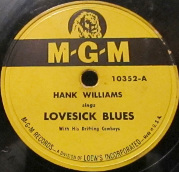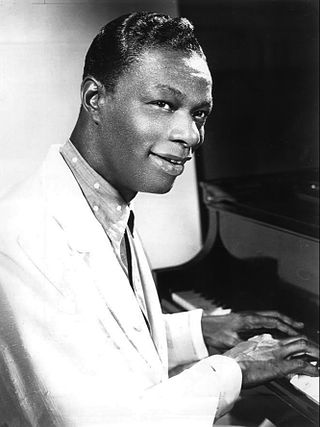Related Research Articles

"Rock Around the Clock" is a rock and roll song in the 12-bar blues format written by Max C. Freedman and James E. Myers in 1952. The best-known and most successful rendition was recorded by Bill Haley & His Comets in 1954 for American Decca. It was a number one single for two months and did well on the United Kingdom charts; the recording also reentered the UK Singles Chart in the 1960s and 1970s.

"Summertime Blues" is a song co-written and recorded by American rock artist Eddie Cochran. It was written by Cochran and his manager Jerry Capehart. Originally a single B-side, it was released in August 1958 and peaked at number 8 on the Billboard Hot 100 on September 29, 1958, and number 18 on the UK Singles Chart. It has been covered by many artists, including being a number-one hit for country music artist Alan Jackson, and scoring notable hits in versions by Blue Cheer, the Who and Brian Setzer, the last of whom recorded his version for the 1987 film La Bamba, in which he portrayed Cochran. Jimi Hendrix performed it in concert. T. Rex recorded their own rendition of the song for their self-titled debut album T. Rex in 1970 and performed it live.

"Hey, Good Lookin'" is a 1951 song written and recorded by Hank Williams, and his version was inducted into the Grammy Hall of Fame in 2001. In 2003, CMT voted the Hank Williams version No. 19 on CMT's 100 Greatest Songs of Country Music. Since its original 1951 recording it has been covered by a variety of artists.

"Lovesick Blues" is a Tin Pan Alley song, composed by Cliff Friend, with lyrics by Irving Mills. It first appeared in the 1922 musical "Oh, Ernest", and was recorded that year by Elsie Clark and Jack Shea. Emmett Miller recorded it in 1925 and 1928, followed by country music singer Rex Griffin in 1939. The recordings by Griffin and Miller inspired Hank Williams to perform the song during his first appearances on the Louisiana Hayride radio show in 1948. Receiving an enthusiastic reception from the audience, Williams decided to record his own version despite initial push back from his producer Fred Rose and his band.
"Honky Tonk Blues" was a hit country and western song written and performed by Hank Williams. The original 1952 recording was a major hit, and it later became a hit for Charley Pride.
"(Now and Then There's) A Fool Such as I" is a popular song written by Bill Trader and published in 1952. Recorded as a single by Hank Snow it peaked at number four on the US country charts early in 1953.
"Someday You'll Want Me to Want You" is a popular song published in 1944 by Jimmie Hodges. The song became a standard, recorded by many pop and country music singers.

"Mona Lisa" is a popular song written by Ray Evans and Jay Livingston for the Paramount Pictures film Captain Carey, U.S.A. (1949). The title and lyrics refer to the renaissance portrait Mona Lisa painted by Leonardo da Vinci. The song won the Oscar for Best Original Song in 1950.

"Spinning Wheel" is a song from 1968 by the band Blood, Sweat & Tears, written by Canadian lead vocalist David Clayton-Thomas and appearing on their eponymous album.
"Jealous Heart" is a classic C&W song written by American country music singer-songwriter Jenny Lou Carson. In the mid 1940s it spent nearly six months on the Country & Western charts. It was subsequently recorded by several pop singers.
"Take These Chains from My Heart" is a song by Hank Williams. It was written by Fred Rose and Hy Heath and was recorded at Williams' final recording session on September 23, 1952, in Nashville. The song has been widely praised; Williams' biographer Colin Escott deems it "perhaps the best song [Rose] ever presented to Hank...It was one of the very few songs that sounded somewhat similar to a Hank Williams song." Williams is backed by Tommy Jackson (fiddle), Don Helms, Chet Atkins, Jack Shook, and Floyd "Lightnin'" Chance (bass). In the wake of Williams' death on New Year's Day, 1953, the song shot to No. 1, his final chart-topping hit for MGM Records. Like "Your Cheatin' Heart," the song's theme of despair, so vividly articulated by Williams' typically impassioned singing, reinforced the image of Hank as a tortured, mythic figure.
"The Tip of My Fingers", also titled "The Tips of My Fingers", is a song written and originally recorded by American country music singer Bill Anderson. First included on his 1962 album Bill Anderson Sings Country Heart Songs, the song was a Top Ten country single for him in 1960.
"Till I Can't Take It Anymore" is a song written by Clyde Otis and Ulysses Burton. It was first recorded by Ben E King in 1968. The song was featured in The Soul Clan's self-titled album The Soul Clan. Dottie West and Don Gibson's version charted at 46 on the Hot Country Songs in 1970. Since then, it has also charted as a single by Andra Willis, whose version went to number 85 on the same chart in 1973. Pal Rakes's version went to number 31 in 1977.
"Back Where I Come From" is a song written and recorded by American country music artist Mac McAnally. It was released in January 1990 as the first single from his album Simple Life. The song reached number 14 on the Billboard Hot Country Singles & Tracks chart. Its B-side, "Company Time", was later a single for Linda Davis in 1994. "Back Where I Come From" was also recorded by Kenny Chesney in 1996.
Hank Snow was a Canadian country music singer-songwriter and musician. His discography consists of 46 studio albums and 89 singles. Of his 89 singles, seven reached number 1 on the U.S. Billboard Hot Country Songs charts and two reached number 1 on the Canadian RPM Country Tracks chart. Snow spent his entire recording career with RCA Victor records. Snow had his first hit in the United States in 1950 with I'm Moving On and his final hit in 1974 with Hello Love, at the time he was the oldest country singer to have a Number #1 charted record.
"Make Love to Me" is a 1954 popular song with words and music written by a larger team than normally is known to collaborate on a song: Bill Norvas, Alan Copeland, and the New Orleans Rhythm Kings, comprising Leon Rappolo, Paul Mares, Ben Pollack, George Brunies, Mel Stitzel, and Walter Melrose. The melody was derived from a 1923 song, "Tin Roof Blues", composed by the New Orleans Rhythm Kings.
"Goodbye, So Long, Hello" is a song initially recorded by Willie P. Bennett on his 1989 album The Lucky Ones. It was written by Bennett and Prairie Oyster band member Russell deCarle.
"I'll Be There "' is a song co-written and originally released as a single by American country artist Ray Price. After becoming a major country hit in 1954, the song has been covered by numerous artists such as Cowboy Copas, Elvis Presley, Connie Smith, Johnny Bush, George Jones and Tammy Wynette, Ronnie Milsap, Heather Myles, Martina McBride, Sam Palladio, Don White & Eric Clapton, Willie Nelson, Nick Lowe, Gail Davies and J. J. Cale.

"I Can't Help It (If I'm Still in Love with You)" is a song written and originally recorded by Hank Williams on MGM Records. It hit number two on the Billboard country singles chart in 1951. In his autobiography, George Jones printed the first six lines of the song and stated, "Its lyrics couldn't be more simple - or profound."
"Settin' the Woods on Fire" was the A-side of a single by Hank Williams, released in September 1952. The song reached number 2 on U.S. Billboard Most Played by Jockeys chart and number 2 on the National Best Sellers chart.
References
- 1 2 Library of Congress. Copyright Office. (1954). Catalog of Copyright Entries 1954 Published Music Jan-Dec 3D Ser Vol 8 Pt 5A. United States Copyright Office. U.S. Govt. Print. Off.
- 1 2 "RCA Victor 20-5500 - 20-6000 78rpm numerical listing discography". www.78discography.com. Retrieved 2022-09-29.
- ↑ "Top RPM Country Tracks: Issue 1291." RPM . Library and Archives Canada. September 29, 1990. Retrieved August 23, 2013.
- ↑ "Prairie Oyster Chart History (Hot Country Songs)". Billboard.
- ↑ "RPM Top 100 Country Tracks of 1990". RPM . December 22, 1990. Retrieved August 23, 2013.
- ↑ Whitburn, Joel (2004). Top R&B/Hip-Hop Singles: 1942-2004. Record Research. p. 612.
- ↑ "Hank Thompson And His Brazos Valley Boys - Golden Country Hits". Discogs.com. 1964. Retrieved 30 April 2021.